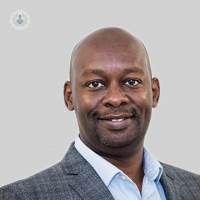The management of emergency spinal surgery during COVID-19 explained
Written by:Elective spinal surgeries may be delayed due to COVID-19, but there are special guidelines in place for patients who need emergency spinal treatment during these difficult times.
It may be confusing not knowing exactly what counts as emergency or urgent treatment, so Mr Mohamed Ahmed, an expert orthopaedic surgeon specialising in spinal surgery, is here to talk us through which types of surgeries are still going ahead and how patients who are worried about their condition can talk to an expert about their problem.

How is spine surgery being affected during Covid-19?
Almost all non-emergency activities have been stopped within the NHS and private healthcare sector due to COVID-19. Private healthcare has been taken under by NHS England and we are primarily attending to emergency cases so to not place an unnecessary burden on the NHS during this time.
To attend to people with doubts or non-emergency spinal issues, we have set up virtual clinics where patients can talk to a consultant through the use of video conferencing.
As the restrictions across the country have started to ease, we have begun seeing non-emergency patients and offering them spinal MRI scans if we deem they would benefit from them.
Which spinal conditions are considered an emergency?
The main spinal conditions considered an emergency and we are continuing to treat are:
- Cauda equina, which must be treated within 24 to 48 hours
- Spinal infections
- Metastatic spinal cord compression
- Spinal fractures
- People with severe pain that is not manageable with medications
Some patients will need treatment to prevent their condition leading to neurological deterioration, e.g. patients with myelopathy. For these people, we must prioritise them and operate at a suitable period.
For patients who have spinal conditions, but are in a stable condition, they can be managed using a more conservative approach and then operated on at a safer date in the future.
The NHS England has released a guideline outlining the clinical management of patients requiring spinal surgery during the COVID-19 pandemic. You can read this in full here.
If someone is in the middle of spinal treatment, what happens now?
If the patient is in the middle of treatment, they will continue with their treatment until we believe it can be managed more conservatively. During which they will be provided with a high level of protection to help prevent the spread of the coronavirus.
Additionally, all patients are swabbed and tested to see if they are positive or negative for COVID-19. If a patient is found to be positive, and because their treatment is an emergency, they will continue being treated and receive full protection. This is a standard procedure that we are doing with every case.
If someone develops a spinal problem, what steps should they follow?
We want to reassure patients that we are still there and available if they need us. They shouldn’t hesitate to contact their GP and insurance company if a spinal problem arises.
If we think the patient needs to be seen face-to-face then we will arrange for this to take place at one of our clinics or we can utilise the video consultation system we have in place. If they need urgent treatment, then they should be reassured that it will still go ahead.
Our patients are a priority and we will ensure that they receive the treatment and support that they need during this time.
What do you think the near future for spinal surgery will look like?
For as long as COVID-19 is around, both doctors and patients everywhere will be integrating the use of technology and virtual consultations more and more into their day-to-day lives. There will be a preference for patients to first be assessed through video conference before having a physical, face-to-face appointment to help reduce the spread of the virus. This will likely become the new norm for the foreseeable future.
In regards to the surgery itself, elective surgery may stay less frequent and doctors and nurses will need to continue providing a higher level of protection in the form of protective equipment and testing before any patient undergoes spinal surgery.
If you are worried about a spinal problem and would like to talk to a consultant, visit Mr Mohamed Ahmed and book an e-Consultation to talk to him.


